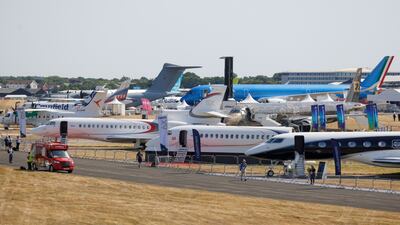The global air industry is in the midst of a post-pandemic rebound, but supply chain problems have left suppliers and manufacturers scrambling to source everything from raw materials to small electronic components to keep production moving.
From multinationals to family-run stockists, few have been spared the impact of shortages or delays. As a result, this week's Farnborough Airshow has been more about the factory floor than the usual shop window for new orders.
"We are keeping our head above water, keeping the flow happening, but the gymnastics required to make that happen are as difficult now as they have ever been," Stephen Timm, president of industry major Collins Aerospace, said.
At the other end of the spectrum, where suppliers lack the clout of a Collins or Honeywell, things are even more uncertain.
"At the moment it's extremely challenging because of the lack of raw materials," said Paul Wingfield, business development manager at Stokenchurch, England-based Aircraft Materials, which supplies alloys including aluminium, nickel, magnesium, titanium and nickel for the industry.
Not only are the mills that his company works with having trouble finding raw materials, but distributors are wary of holding on to inventory when there is a risk of recession.
"Nobody knows what the economy is going to do, so nobody's willing to invest in stock at the moment," Mr Wingfield said.
In conversations at this week's show, suppliers say material and parts delays have meant pushing manufacturers to order earlier, while manufacturers like Boeing have found themselves wading into the supply chain to keep parts flowing.
"We're going deeper into the supply chain than we've ever had to go to help our suppliers solve problems," said Cory Gionet, Boeing's vice president in charge of supply chains for commercial airplanes.
Earlier this year, Boeing said its 737 MAX aircraft production and deliveries were hit by shortages of a particular wiring connector.
Suppliers face lengthening lead times to source materials or components that can now run six months to over a year, threatening the manufacturers' plans to ramp up output.
To guarantee parts delivery, some suppliers are pushing manufacturers to order many months in advance, even if it means suppliers have to tie up capital by holding on to inventory for longer.
Switching their own suppliers can be almost impossible in a highly-regulated industry where components have to undergo rigorous approval processes.
"It's not a case of picking up and going to a different supplier, the validation process for doing that is actually often longer than the lead time," said Neil Lawrence, business development engineer at Woking, England-based Magnet Schultz.
It makes solenoids — electromagnetic valves — used in everything from plane hydraulics controls to air conditioning. Those valves range in price from a few hundred to tens of thousands of pounds.
Shortages of electronics components mean some will not be delivered for more than a year.
"We're getting terrible, terrible lead times on some parts," Mr Lawrence said.
Supply chain problems come at a time when the industry is eager to build ever more planes.
Airbus wants to raise A320 production rates to 75 single-aisle aircraft monthly over the next three years, from 50 now. But delays in engine supplies have held back aircraft deliveries.
Engine maker Pratt & Whitney, like Collins, a unit of Raytheon Technologies, said this week it aimed to get its engine deliveries for the A320 back on track by early 2023 as it battles labour shortages and supply chain snags.
"Certainly we're not happy about the position that we're in right now," Pratt & Whitney president Shane Eddy said.
Airbus chief executive Guillaume Faury said the show had brought slightly more comfort on engine delays.
But France's Dassault Aviation said it was "very concerned" about supply chains.



























